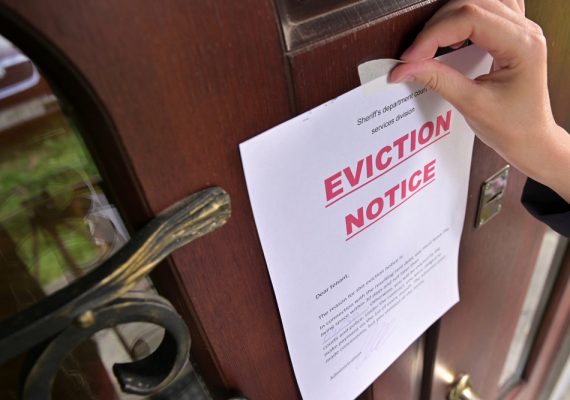What is an Illegal Eviction in New York?
A landlord or tenant should understand what is an illegal eviction in the state of New York. It’s important for both parties to understand what constitutes an illegal eviction in NYC, and how the legal eviction process works. Tenants facing eviction need to understand their rights while landlords and property managers need to be sure they are following the legal parameters for eviction.
Bennett Movers specializes in moving evictions as well as guiding customers through the legal process of eviction. With over 25 years of experience, Bennett Movers has the expertise, licensure and insurance to help customers through eviction proceedings.
Understanding the Process
In New York state, there is a procedure landlords and property owners must follow to evict tenants legally. Otherwise, landlords can be harshly penalized for evicting tenants without adhering to the legal process. Read more about the process below.
How to legally evict a tenant:
- The legal eviction process starts with a demand for rent, also known as a three-day notice. In cases where rent has been paid, but a tenant has violated the lease for another reason (i.e. having a pet in a pet-free building), a notice of lease violation will be served. The notice should outline the amount of money owed, as well as the tenants name and address. The notice will allow three business days for the tenant to meet the property owner’s request.
- After the demand for rent has been served, the tenant has three days to pay rent, correct the lease violation, or vacate the property before the landlord is within their rights to file an eviction lawsuit.
- Upon filing the eviction lawsuit, the district or county court will assign a date for a hearing. The hearing will take place before a judge who will evaluate testimony from the tenant and landlord. Should the judge side with the landlord, the landlord will receive a warrant of nonpayment.
- With the warrant of nonpayment, the landlord has the legal grounds to have the sheriff evict the tenant.
Additionally, property owners should know the state of New York offers the Small Property Owner Nonpayment Petition Program to help owners of small rental properties who do not have legal representation. To qualify for the program, property owners must meet the small property owner specifications. For those who are eligible, the program helps property owners draw up the necessary documents for eviction.
Note: There is an individual program for properties in New York City separate from the program serving the rest of New York State.
Count on the experts at Bennet Movers
Bennett Movers understands the ins and outs of the eviction process to ensure they are only facilitating moving evictions under legal circumstances. Whether a customer is a tenant facing eviction or a landlord trying to remove a tenant, Bennett Movers will make sure the eviction is handled correctly. Contact the experts at Bennet Movers for answers to your eviction questions and assistance with any and all of your moving needs.
A landlord or tenant should understand what is an illegal eviction in the state of New York. It’s important for both parties to understand what constitutes an illegal eviction in NYC, and how the legal eviction process works. Tenants facing eviction need to understand their rights while landlords and property managers need to be sure they are following the legal parameters for eviction.
Bennett Movers specializes in moving evictions as well as guiding customers through the legal process of eviction. With over 25 years of experience, Bennett Movers has the expertise, licensure and insurance to help customers through eviction proceedings.
Understanding the Process
In New York state, there is a procedure landlords and property owners must follow to evict tenants legally. Otherwise, landlords can be harshly penalized for evicting tenants without adhering to the legal process. Read more about the process below.
How to legally evict a tenant:
- The legal eviction process starts with a demand for rent, also known as a three-day notice. In cases where rent has been paid, but a tenant has violated the lease for another reason (i.e. having a pet in a pet-free building), a notice of lease violation will be served. The notice should outline the amount of money owed, as well as the tenants name and address. The notice will allow three business days for the tenant to meet the property owner’s request.
- After the demand for rent has been served, the tenant has three days to pay rent, correct the lease violation, or vacate the property before the landlord is within their rights to file an eviction lawsuit.
- Upon filing the eviction lawsuit, the district or county court will assign a date for a hearing. The hearing will take place before a judge who will evaluate testimony from the tenant and landlord. Should the judge side with the landlord, the landlord will receive a warrant of nonpayment.
- With the warrant of nonpayment, the landlord has the legal grounds to have the sheriff evict the tenant.
Additionally, property owners should know the state of New York offers the Small Property Owner Nonpayment Petition Program to help owners of small rental properties who do not have legal representation. To qualify for the program, property owners must meet the small property owner specifications. For those who are eligible, the program helps property owners draw up the necessary documents for eviction.
Note: There is an individual program for properties in New York City separate from the program serving the rest of New York State.
Count on the experts at Bennet Movers
Bennett Movers understands the ins and outs of the eviction process to ensure they are only facilitating moving evictions under legal circumstances. Whether a customer is a tenant facing eviction or a landlord trying to remove a tenant, Bennett Movers will make sure the eviction is handled correctly. Contact the experts at Bennet Movers for answers to your eviction questions and assistance with any and all of your moving needs.






